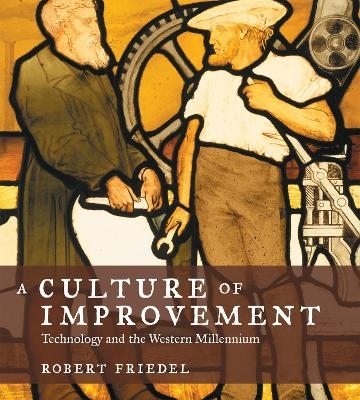
A Culture of Improvement
Technology and the Western Millennium
Seiten
2010
MIT Press (Verlag)
978-0-262-51401-9 (ISBN)
MIT Press (Verlag)
978-0-262-51401-9 (ISBN)
- Titel ist leider vergriffen;
keine Neuauflage - Artikel merken
How technological change in the West has been driven by the pursuit of improvement: a history of technology, from plows and printing presses to penicillin, the atomic bomb, and the computer.
Why does technology change over time, how does it change, and what difference does it make? In this sweeping, ambitious look at a thousand years of Western experience, Robert Friedel argues that technological change comes largely through the pursuit of improvement-the deep-rooted belief that things could be done in a better way. What Friedel calls the "culture of improvement" is manifested every day in the ways people carry out their tasks in life-from tilling fields and raising children to waging war.
Improvements can be ephemeral or lasting, and one person's improvement may not always be viewed as such by others. Friedel stresses the social processes by which we define what improvements are and decide which improvements will last and which will not. These processes, he emphasizes, have created both winners and losers in history.
Friedel presents a series of narratives of Western technology that begin in the eleventh century and stretch into the twenty-first. Familiar figures from the history of invention are joined by others-the Italian preacher who described the first eyeglasses, the dairywomen displaced from their control over cheesemaking, and the little-known engineer who first suggested a grand tower to Gustav Eiffel. Friedel traces technology from the plow and the printing press to the internal combustion engine, the transistor, and the space shuttle. Friedel also reminds us that faith in improvement can sometimes have horrific consequences, as improved weaponry makes warfare ever more deadly and the drive for improving human beings can lead to eugenics and even genocide. The most comprehensive attempt to tell the story of Western technology in many years, engagingly written and lavishly illustrated, A Culture of Improvement documents the ways in which the drive for improvement has shaped our modern world.
Why does technology change over time, how does it change, and what difference does it make? In this sweeping, ambitious look at a thousand years of Western experience, Robert Friedel argues that technological change comes largely through the pursuit of improvement-the deep-rooted belief that things could be done in a better way. What Friedel calls the "culture of improvement" is manifested every day in the ways people carry out their tasks in life-from tilling fields and raising children to waging war.
Improvements can be ephemeral or lasting, and one person's improvement may not always be viewed as such by others. Friedel stresses the social processes by which we define what improvements are and decide which improvements will last and which will not. These processes, he emphasizes, have created both winners and losers in history.
Friedel presents a series of narratives of Western technology that begin in the eleventh century and stretch into the twenty-first. Familiar figures from the history of invention are joined by others-the Italian preacher who described the first eyeglasses, the dairywomen displaced from their control over cheesemaking, and the little-known engineer who first suggested a grand tower to Gustav Eiffel. Friedel traces technology from the plow and the printing press to the internal combustion engine, the transistor, and the space shuttle. Friedel also reminds us that faith in improvement can sometimes have horrific consequences, as improved weaponry makes warfare ever more deadly and the drive for improving human beings can lead to eugenics and even genocide. The most comprehensive attempt to tell the story of Western technology in many years, engagingly written and lavishly illustrated, A Culture of Improvement documents the ways in which the drive for improvement has shaped our modern world.
Robert Friedel is Professor in the Department of History at the University of Maryland. He is the author of Pioneer Plastic: The Making and Selling of Celluloid, Edison's Electric Light, and Zipper: An Exploration in Novelty.
| Reihe/Serie | The MIT Press |
|---|---|
| Zusatzinfo | 117 illus.; 117 Illustrations |
| Sprache | englisch |
| Maße | 203 x 229 mm |
| Gewicht | 1043 g |
| Themenwelt | Geschichte ► Teilgebiete der Geschichte ► Technikgeschichte |
| ISBN-10 | 0-262-51401-X / 026251401X |
| ISBN-13 | 978-0-262-51401-9 / 9780262514019 |
| Zustand | Neuware |
| Haben Sie eine Frage zum Produkt? |
Mehr entdecken
aus dem Bereich
aus dem Bereich
Buch | Softcover (2024)
Lehmanns Media (Verlag)
19,95 €
Digitalisierung neu denken für eine gerechte Gesellschaft
Buch | Hardcover (2023)
Quadriga (Verlag)
20,00 €
Vom Perceptron zum Deep Learning
Buch | Softcover (2022)
Springer Vieweg (Verlag)
19,99 €


